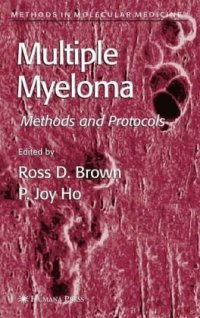
Ebook: Multiple Myeloma: Methods and Protocols
- Genre: Medicine
- Tags: Hematology
- Series: Methods in Molecular Medicine 113
- Year: 2005
- Publisher: Humana Press
- Edition: 1
- Language: English
- pdf
Although there is no therapy that could be considered curative for patients with multiple myeloma, recent research has gained considerable momentum and yielded a real prospect for achieving a significant improvement in response to therapy. In Multiple Myeloma: Methods and Protocols, established researchers with hands-on experience detail a comprehensive set of classic and innovative methodologies used in many laboratories for the investigation of this disease. These readily reproducible techniques range from the standard Plasma Cell Labeling Index methodology, which is used routinely in many laboratories around the world to determine prognosis, to a final chapter on making sense of microarrays, and include the full spectrum of cytogenetic and molecular diagnostic methods. The protocols follow the successful Methods in Molecular Medicine™ series format, each offering step-by-step laboratory instructions, an introduction outlining the principle behind the technique, lists of the necessary equipment and reagents, and tips on troubleshooting and avoiding known pitfalls.
Comprehensive and highly practical, Multiple Myeloma: Methods and Protocols offers both novice and experienced researchers alike a gold-standard collection of proven techniques for investigating the pathogenesis of multiple myeloma and identifying new therapeutic targets.
A comprehensive collection of classic and innovative methodologies used in many laboratories for the investigation of multiple myeloma. These readily reproducible techniques range from the standard Plasma Cell Labeling Index methodology to a final chapter on making sense of microarrays, and include the full spectrum of cytogenetic and molecular diagnostic methods. The protocols follow the successful Methods in Molecular Medicine™ series format, each offering step-by-step laboratory instructions, an introduction outlining the principle behind the technique, lists of the necessary equipment and reagents, and tips on troubleshooting and avoiding known pitfalls. These proven techniques are ideal for studying the pathogenesis of multiple myeloma and identifying new therapeutic targets.